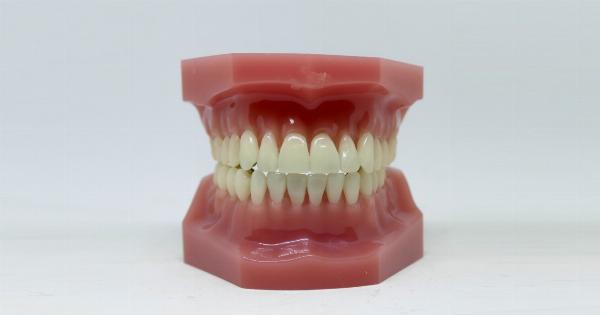Fluoride is a natural mineral that is essential for maintaining optimal dental health. It is found in many water sources, as well as in certain foods and dental products.
In recent years, there has been a debate about the benefits and potential risks of fluoride. However, numerous studies have confirmed that fluoride can play a significant role in preventing tooth decay and improving overall dental wellness. In this article, we will explore the various ways in which fluoride can enhance your dental health.
The Role of Fluoride in Preventing Tooth Decay
Tooth decay, also known as dental caries, is one of the most common oral health issues worldwide. It occurs when bacteria in the mouth produce acid that attacks the enamel, causing cavities.
Fluoride helps prevent tooth decay by strengthening the enamel and making it more resistant to acid attacks.
When you consume fluoride, it is absorbed into the enamel of your teeth. This process promotes the remineralization of the enamel, which means it helps repair the areas that have been weakened by acid.
Additionally, fluoride can disrupt the metabolism of bacteria in the mouth, reducing their ability to produce the acid that leads to tooth decay.
Fluoride and the Development of Strong Teeth
Fluoride is particularly important for children during the development of their teeth. Adequate intake of fluoride helps in the formation of strong and healthy permanent teeth.
It is during childhood that teeth are most vulnerable to tooth decay, making fluoride even more essential.
When young children consume fluoride, it becomes incorporated into the structure of their developing teeth. This incorporation strengthens the enamel of primary and permanent teeth, making them more resistant to acid attacks.
Regular fluoride exposure, whether through drinking water or topical applications, can significantly reduce the risk of cavities and dental problems later in life.
Topical Fluoride Applications
In addition to consuming fluoride, there are topical applications that can provide a concentrated dose of the mineral to the teeth.
These applications come in various forms, including toothpaste, mouth rinses, and professional treatments provided by dentists.
Toothpaste is often the primary source of fluoride for many individuals. Brushing with fluoridated toothpaste helps to both clean the teeth and deliver fluoride to the enamel surface.
Dentists recommend using a pea-sized amount of fluoride toothpaste for children under six to minimize the risk of fluorosis, a condition that occurs due to excessive fluoride ingestion during tooth development.
Mouth rinses with fluoride are another effective way to introduce the mineral into your oral care routine. These rinses can complement brushing and provide additional protection against tooth decay.
However, it is important to follow the instructions on the product packaging and consult with your dentist on their appropriate usage.
Professional fluoride treatments, often performed by dental hygienists or dentists, involve the application of a highly concentrated fluoride gel or varnish to the teeth.
These treatments provide an extra boost of fluoride and are typically recommended for individuals who are at a higher risk of developing dental caries.
Community Water Fluoridation
Community water fluoridation is the process of adjusting the fluoride concentration in public water supplies to a level that helps prevent tooth decay.
Public health organizations, including the World Health Organization (WHO) and the American Dental Association (ADA), strongly support community water fluoridation as a safe and effective measure to improve dental health.
Water fluoridation has been recognized as one of the most significant public health achievements of the 20th century. It has contributed to the substantial decline in tooth decay rates since its introduction.
This approach benefits everyone in the community, regardless of age, socioeconomic status, or access to dental care. It is especially crucial for those who may not have regular access to dental services.
Fluoride Supplements
In some cases, individuals may require fluoride supplements to ensure they are receiving an adequate amount of fluoride.
These supplements are typically recommended for children living in areas without fluoridated water or for those who are more susceptible to tooth decay.
Fluoride supplements are available in the form of drops, tablets, or lozenges. The dosage prescribed will depend on the child’s age and the fluoride concentration in their water source.
It is essential to consult with a dentist or pediatrician before starting any fluoride supplements to ensure proper dosage and usage.
Fluoride Safety and Recommendations
While fluoride offers numerous benefits for dental health, it is important to use it safely and in appropriate amounts.
The recommended fluoride concentration varies depending on age, with higher levels advised during tooth development and lower levels for general oral health maintenance.
For children under six years old, it is advised to supervise brushing and use no more than a pea-sized amount of fluoride toothpaste. This helps prevent fluorosis while providing the benefits of fluoride.
In case of accidental ingestion of a significant amount of fluoride toothpaste, seeking medical attention is recommended.
For adults and children over six years old, using a toothpaste with fluoride and drinking fluoridated water is generally sufficient to maintain good oral health.
This combined with regular dental check-ups and a balanced diet can help prevent tooth decay and other dental issues.
Conclusion
Fluoride plays a vital role in improving dental wellness and preventing tooth decay. It strengthens the enamel, reduces acid production by oral bacteria, and enhances the development of strong teeth, especially in children.
Topical fluoride applications, community water fluoridation, and supplements are effective ways to ensure adequate fluoride intake. By using fluoride safely and as recommended, individuals can enjoy the benefits of improved dental health and a reduced risk of tooth decay.





























